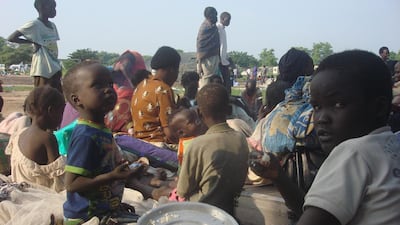JUBA, SOUTH SUDAN // South Sudanese vice president Riek Machar ordered his opposition forces to cease fighting on Monday, after his rival, president Salva Kiir, ordered government forces to do the same.
“The president has declared a unilateral ceasefire. I want to reciprocate the declaration of unilateral ceasefire,” Mr Machar said. He ordered it to start at 8pm local time, two hours after the deadline set by Mr Kiir.
Monday saw some of the heaviest fighting between the two sides after clashes first erupted on Thursday.
Explosions and heavy weapons gunfire shook the capital, Juba, as the United Nations expressed deep alarm over the surge in violence, which has left several hundred people dead and risks plunging the country into a new civil war.
Deadly gun battles sent thousands of people fleeing and widespread shooting prevented residents from moving in the city.
A “massive explosion” hit shortly after 9am followed by further blasts in the Tomping area of Juba, home to embassies, the airport and a UN base, said an aid worker.
“It rings through the whole city every time they fire,” said the aid worker, who spoke on condition of anonymity.
Explosions and “very heavy gunfire” sounding “like popcorn” was reported by a resident in the Gudele area.
Considerable fighting has centred around the UN base in the Jebel area, where some 30,000 civilians have taken refuge. The opposition also has a base near Jebel and their leader’s home is there.
Two government helicopters have been bombing areas near the base while ground forces shell the base, including a camp of tens of thousands of displaced civilians, according to a source within the UN compound. The displaced civilians are mostly of the Nuer ethnicity and sought protection from the UN after a series of government-led killings of Nuer in Juba in 2013 which sparked the civil war, according to an African Union commission of inquiry.
Government officials have repeatedly accused the civilians inside the UN bases of being rebels or rebel supporters.
The current fighting between soldiers loyal to Mr Kiir, a member of the Dinka tribe, and former rebels backing Mr Machar, a Nuer, was triggered by a deadly altercation at a checkpoint on Thursday night.
* Reuters, Associated Press and Agence France-Presse

